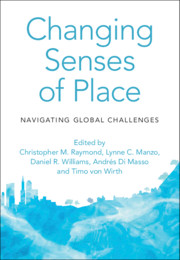Book contents
- Changing Senses of Place
- Changing Senses of Place
- Copyright page
- Dedication
- Contents
- Contributors
- Foreword
- Preface
- Acknowledgements
- Introduction
- Part I Climate Change and Ecological Regime Shifts
- Part II Migration, Mobility and Belonging
- Part III Renewable Energy Transitions
- Part IV Nationalism and Competing Territorial Claims
- Part V Urban Change
- Part VI Technological and Legal Transformations
- 19 Electronically Mediated Sense of Place
- 20 A Dynamic View of Local Knowledge and Epistemic Bonds to Place
- 21 Social Media and Experiences of Nature
- Part VII Design and Planning Strategies for Changing Senses of Place
- Part VIII Conclusion
- Index
- References
20 - A Dynamic View of Local Knowledge and Epistemic Bonds to Place
Implications for Senses of Place and the Governance of Biodiversity Conservation
from Part VI - Technological and Legal Transformations
Published online by Cambridge University Press: 15 July 2021
- Changing Senses of Place
- Changing Senses of Place
- Copyright page
- Dedication
- Contents
- Contributors
- Foreword
- Preface
- Acknowledgements
- Introduction
- Part I Climate Change and Ecological Regime Shifts
- Part II Migration, Mobility and Belonging
- Part III Renewable Energy Transitions
- Part IV Nationalism and Competing Territorial Claims
- Part V Urban Change
- Part VI Technological and Legal Transformations
- 19 Electronically Mediated Sense of Place
- 20 A Dynamic View of Local Knowledge and Epistemic Bonds to Place
- 21 Social Media and Experiences of Nature
- Part VII Design and Planning Strategies for Changing Senses of Place
- Part VIII Conclusion
- Index
- References
Summary
This chapter argues that a better understanding of people–place relations and their role in the local reception – and frequent contestation – of today’s supra-national legal orders for biodiversity conservation requires considering the epistemic dimension. This means paying more attention to local knowledge and the epistemic bonds to place it weaves, recognising local cultural-worlds not just as meaning and identity-worlds, but also as knowledge-worlds. It illustrates these arguments with extracts from fishers and farmers governed by Natura 2000 biodiversity laws, showing how local knowledge provides a relevant lens for local assessment of such laws, a process sometimes leading to contestation, sometimes to acceptance, and a process always done together with others. This calls for the creation of these legal orders to not rely exclusively on expert views, instead incorporating local inputs. By adding the epistemic dimension, senses of place can become a more relational, dynamic and plural concept, encompassing the three processes of attachment, meaning-making and knowing.
Keywords
Information
- Type
- Chapter
- Information
- Changing Senses of PlaceNavigating Global Challenges, pp. 259 - 270Publisher: Cambridge University PressPrint publication year: 2021
References
Accessibility standard: Unknown
Why this information is here
This section outlines the accessibility features of this content - including support for screen readers, full keyboard navigation and high-contrast display options. This may not be relevant for you.Accessibility Information
- 7
- Cited by
